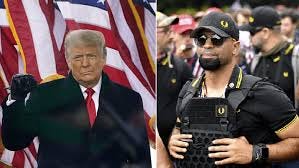Trump is an Illegitimate President
His 2021 Attempted Coup Disqualifies Trump from the Presidency
The Chief Justice has now sworn in Trump to serve a term as president of the U.S. But Trump has no legal right to serve as president due to his organizing, fomenting and encouraging his January 6, 2021 Insurrectionists. He predicted it would be “wild,” and like Captain Kirk, he made it so.
Trump even encouraged his Insurrectionists to hang his Vice-President for his disloyalty to Trump by following his Constitutional duty and not disregarding votes from states that held safe and honest elections but who did not support Trump for re-election. Trump thus threatened the life of VP Mike Pence, a federal crime under 18 U.S.C. sec. 1113, for attempted murder, and under 18 U.S.C. sec. 1114 for attempting to murder an officer of the U.S., the Vice-President.
Trump’s actions were well documented in the Report of the Special Counsel to the Attorney General, dated January 7, 2025, on Trump’s activities promoting, inciting, organizing and encouraging his Insurrectionists to prevent the counting of Elector ballots to certify the election of the President of the U.S. and to prevent the confirmation of Biden as the winner of the 2020 election.
Trump’s actions, documented in the Special Counsel Report, were submitted to the Grand Jury in Washington, and they voted to issue an Indictment of Trump under several federal statutes, and the Special Counsel described the charges and their statutory violations:
conspiring to obstruct the governmental function of selecting and certifying the President of the United States, in violation of 18 U.S.C. § 371; obstructing and attempting to obstruct the official proceeding on January 6, 2021, in violation of 18 U.S.C. § 1512(c)(2); conspiring to obstruct the official proceeding, in violation of 18 U.S.C. § 1512(k); and conspiring to violate the federal rights of citizens to vote and have their votes counted, in violation of 18 U.S.C. § 241.
Trump could also have been charged under 18 U.S.C. sec. 372 for entering into a Conspiracy to impede or injure an officer and under 18 U.S.C. sec. 373 for Solicitation of persons to commit injurious acts to persons or property. Trump might also be charged under 18 U.S.C. sec. 2101 for organizing, promoting and encouraging a riot.
Most interesting is 18 U.S.C. sec. 2383 which applies to anyone who incites or assists an insurrection:
Whoever incites, sets on foot, assists, or engages in any rebellion or insurrection against the authority of the United States or the laws thereof, or gives aid or comfort thereto, shall be fined under this title or imprisoned not more than ten years, or both; and shall be incapable of holding any office under the United States.
The Special Counsel report shows that Trump incited and assisted an insurrection against the authority of the United States and its laws. The last phrase of that provision says that any such person who incites or assists an insurrection shall be incapable of holding any office under the United States.
Under Section 2383, Trump could be held incapable of holding the office of President of the United States based on the evidence set out in the Special Counsel’s report.
Since Trump’s Justice Department will not apply Section 2383 to Trump, perhaps an organization that challenges any action taken by Trump as President could claim that it is not authorized or legally binding since Trump was incapable of holding the Office of President under Section 2383 when he approved that presidential action.
Most important in this analysis is Section 3 of the 14th Amendment which says:
No person shall be a Senator or Representative in Congress, or elector of President and Vice-President, or hold any office, civil or military, under the United States, or under any State, who, having previously taken an oath, as a member of Congress, or as an officer of the United States, or as a member of any State legislature, or as an executive or judicial officer of any State, to support the Constitution of the United States, shall have engaged in insurrection or rebellion against the same, or given aid or comfort to the enemies thereof. But Congress may by a vote of two-thirds of each House, remove such disability.
The original intent of Section 3 was to apply to Confederate soldiers and officers to prevent them from obtaining federal office after fighting against the Union in the Civil War. The language of Section 3 is very inclusive applying to anyone holding any office under the United States who previously took an oath to support the Constitution but who then engaged in an insurrection or rebellion against the U.S.
Some have raised questions whether Section 3 applies to the President as his office is not mentioned. But most feel that the language applying to any office under the United States, civil or military, applies to the President. Notice that Section 2383 applies to anyone engaging in an insurrection or rebellion. It is more inclusive than Section 3 as Section 2383 does not require that the person engaging in insurrection previously took an oath to support the Constitution. But Section 2383 uses language like Section 3 in applying to anyone holding office under the United States, and both should be interpreted as applying to the President.
It is doubtful that the Supreme Court would permit anyone to bring a judicial action against Trump to prevent him serving as President as questions of standing to sue would be paramount and would probably be decided against the Plaintiff.
But this creates an alternative pathway where someone or some group sues to invalidate some action taken by Trump that they oppose and claim that Trump had no authority to take the action, be it adopting a regulation, vetoing an Act of Congress, or issuing an Executive Order, due to his inciting, fomenting and organizing the January 6 attack on the Capitol, as those actions disqualify him from holding the office of President as they were an insurrection or rebellion. Section 3 and Section 2383 could both apply.
The Plaintiffs in any such challenge to a presidential action could reference and incorporate the Report of the Special Counsel as a firm evidentiary basis for the claim that Trump is an illegitimate president who does not have legitimate presidential authority. Ultimately, the Plaintiffs in such a case would have to prove that Section 3 and Section 2383 apply to Trump. The Special Counsel’s Report would be an important road map to identify Trump’s actions that could be disqualifying under Section 3 and Section 2383.
I am not suggesting that this would be an easy evidentiary burden to meet, but it may provide an avenue to challenge a presidential action based on the illegitimacy of the president. The Special Counsel’s Report lists individuals and documents that could be used to establish presidential liability under Section 3 and Section 2383.
The Special Counsel concluded his Report stating “the Office assessed that the admissible evidence was sufficient to obtain and sustain a conviction at trial.” Sp. Counsel Report at 136. This means that the Special Counsel believed the evidence was strong enough that they could get a conviction of Trump where a jury could find that there was no reasonable doubt that Trump was guilty as charged in the Superseding Indictment issued after the Supreme Court’s presidential immunity decision.
Though Trump’s election in 2024 prevented the Special Counsel from presenting their case to a jury, they have high confidence that the evidence they elicited would result in a jury verdict against Trump.
The Supreme Court has not decided whether or not Section 3 or Section 2383 apply to Trump. The decision invalidating Colorado’s removal of Trump from the ballot did not decide the factual questions. Rather the decision only decided that one state could not on its own remove Trump from the ballot. Such removal, the Court hinted would need to come from Congress or conceivably a federal court.
Trump Pardons 1,600 Members of his Insurrection Army
On the first day of his presidency, Trump pardoned or commuted the sentences of all 1,600 persons found or who pleaded guilty to felonies and misdemeanors, including the Proud Boys and the Oath Keepers and their leaders. Many of those pardoned by Trump were convicted of assaulting police officers trying to protect and secure the Capitol from the onslaught of Trump’s army of insurrectionists.
If nothing else Trump’s pardons demonstrate that he was in league with the insurrectionists, and the battles they fought against police were Trump’s battles. Trump showed he was their aider and abettor and leader as he took all of those convicted by judges and juries of criminal acts at the Capitol under his wing and gave them protection from incarceration.
Trump’s pardons show he was one of them and that their insurrection was his insurrection. Trump was proud of the lawless activity of his horde, and he gave them freedom though they were justly convicted of injuring police and others trying to protect the nation’s Capitol.
Since Trump has so closely embraced the insurrectionists, their acts of disrespect for the law and police officers are one with Trump. He was their leader, and they followed him to commit criminal acts of violence.
Trump’s pardons of these criminals shows Trump is an illegitimate president, serving despite Section 3 and Section 2383, so his actions should be declared unauthorized as Trump’s taking the oath to protect the Constitution again was as hollow as his first oath to protect that great document. Trump’s oath means little to him in light of his mass pardon of violent criminals.




